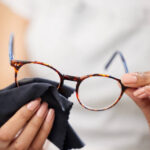No products in the cart.

Blue light: its advantages and disadvantages
There is an ongoing controversy on the advantages and disadvantages of blue light. While Blue light has the potential to be a useful aid in the fight against sleeplessness, on the other hand, it can harm a person’s eyes permanently. What then is the issue with blue light and Why is the biological impact of this wavelength necessary for our bodies? How do we get the benefits of blue light, while shielding our eyes from its possible harmful effects?
The Good:
Regulation of Circadian Rhythm: Our circadian rhythm, or internal clock that governs our sleep-wake cycles, is regulated when we are exposed to natural blue light during the day. It helps sustain a normal sleep-wake cycle and encourages attentiveness.
Improved Mood and Cognitive Function: Research indicates that blue light exposure may help elevate mood and enhance cognitive function, especially when it comes to memory- and attention-demanding tasks.
The Bad:
Disruption of Sleep: Artificial blue light exposure can disrupt the synthesis of melatonin, a hormone that controls sleep, particularly in the evening. This may result in worse sleep quality and trouble falling asleep.
Eye Strain and Fatigue: Digital eye strain can result from extended exposure to blue light-emitting screens. It can induce symptoms including headaches, impaired vision, and eye fatigue.
Potential Retina Damage: According to certain research, long-term exposure to intense blue light, particularly from LED screens, may be a factor in retinal deterioration. However, further study is required to completely comprehend the long-term consequences.
Mitigating Strategies:
Blue Light Filters: Blue light filters or “night mode” settings are now found on a lot of electronic gadgets and displays, which lower the quantity of blue light released, especially at night.
Limiting Screen Time Before Bed: Limiting screen time at least one hour before bedtime can help improve sleep quality by reducing the negative effects on melatonin synthesis.
Wearing Blue Light Blocking Glasses: Wearing Eyewarez blue light-blocking or blue-reducing glasses might help prevent eye strain and sleep disturbances, especially at night. Buy here: https://myeyewarez.com
Using Warm-Toned Lighting: Blue light can also be less of an influence on sleep by using warm-toned or amber lighting in the evening rather than harsh white illumination.




Leave a Reply